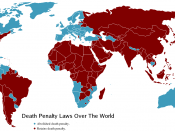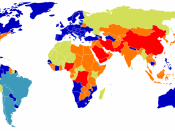Mohamed � PAGE �7�
Name: Saned Mohamed
Professor:
Class: Phil 6 Ethics and Society
Date: 10/09/08
"The Death Penalty Deterrent or an Unjust Waste of Life"
Adopted in 1791 as part of the Bill of Rights, the Eighth Amendment declares that "Excessive bail shall not be required, nor excessive fines imposed, nor cruel and unusual punishments inflicted" on the citizen of the United States of America. The section prohibiting "cruel and unusual punishments" has been the most important and most argued of the three restrictions imposed by the Eighth Amendment. Many philosophers have argued for and against the death penalty and whether or not it is considered a "cruel and unusual punishment". In his essay "Deterrence and the Death Penalty" Pojman uses social utility to explain why the death penalty is humane and a deterrent of future crime. Pojman uses two arguments to support his position "the best bet argument and commonsense or anecdotal evidence" (140).
Both of his arguments can be used against him and can prove why his position is not ethically justifiable.
Pojman's argument can (delete) clearly makes sense, but can't fully prove why the death penalty will deter future crime. Pojman can't find any statistical evidence that state (delete) the death penalty deters future crimes so he uses the best bet argument. Yet on the other hand according to Pojman there is no evidence that shows the death penalty is a nondeterrence of future crime. The best bet argument, which uses rational ? as its bases was set forth by Ernest Van den Haag. Haag argued that the death penalty deters future crime. If it does deter future crime then we save the lives of innocent people if the death penalty becomes legal. If we are wrong and it doesn't deter future crime...


